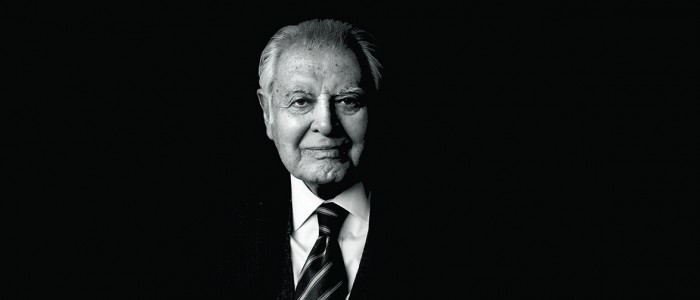ANDRÉS VELASCO
SANTIAGO – “Every country gets the leaders it deserves,” the French counter-revolutionary Joseph de Maistre quipped. He was wrong. The countries of Latin America did not deserve the blustering demagogues and iron-fisted generals who, until recently, often occupied the seats of government.
A look at Venezuela or Nicaragua reminds us that the demagogues and the populists are not yet gone. But a new kind of leader – moderate, intellectually humble, and prone to gradualism – has been in ascendance since the 1990s. This is the kind of leadership Latin America does indeed deserve.
The elder statesman of this generation of pragmatists died last week. In a continent of loud-mouthed leaders, Patricio Aylwin, who led Chile from dictatorship to democracy in 1990, was an oddity: a soft-spoken professor whose great love was the study of the more abstruse aspects of administrative law. His legacy sheds light on what moderate leaders in Latin America must do if they are to succeed.
Aylwin faced one of the toughest moral choices any leader of a newly re-established democracy can confront: how far to push prosecution of those who had abducted, tortured, and killed thousands of Chileans during General Augusto Pinochet’s dictatorship. His answer remains controversial to this day. He would, he said, pursue justice “to the extent [that it is] possible.”
At first, the idea seems shocking: Isn’t justice supposed to be an absolute moral imperative? It is. But history shows that it is an imperative that cannot always be perfectly achieved. Obtaining justice, however imperfect, is itself a moral goal. Aylwin understood this, and acted accordingly.
The coalition he led boldly took up Pinochet’s challenge to participate in a 1988 referendum on extending his rule, won the vote against all odds, and in 1990 removed the dictator from office. If there was ever a case of a dictator going not by the sword, but by the mighty pen, this was it.
Once in office, the new democratic government decided that before punishment could be meted out, the whole truth about the violation of human rights should be established. Chile’s “Truth and Reconciliation Commission” became a model for similar bodies established in the 1990s in South Africa and other countries worldwide. Aylwin went on television to share the grim truth with citizens. His voice breaking, he apologized on behalf of the state for the crimes committed. The voices of Chileans of my generation still break when we recall that moment.
The courts did their job. Pinochet never saw the inside of a cell, but many of his henchmen – including the head of his secret police – served long sentences. How many countries emerging from dark authoritarian rule (one thinks of Russia, East Germany, Spain, Portugal, or Brazil) can claim the same? Justice in Aylwin’s Chile was carried out to the extent possible, but it was nothing to scoff at.
Aylwin belonged to the Christian Democratic Party, which in Chile emerged from the ashes of the old Conservative Party. He was a practicing Catholic. He would not have liked to be called a liberal. Yet he governed in the style of the philosopher Isaiah Berlin’s liberal fox, who knows many things, as opposed to Berlin’s hedgehog, who knows one big thing.
Populists, in Latin America and elsewhere, are always hedgehogs. They are dogmatic. The world has to adapt to their monolithic ideology, not vice versa. Pragmatism, policy experimentation, gradual learning – this is not their thing. “When the facts change, I change my mind. What do you do, sir?” The spirit behind this famous quip, attributed to John Maynard Keynes, would be alien to the populist camp, but not to the generation of Latin American pragmatists epitomized by Aylwin.
He was the anti-populist. Coming to office after 17 years of right-wing authoritarian rule, the temptation to promise handsomely and spend lavishly was enormous. Instead, he practiced fiscal austerity and offered Chileans dignity, plus sweat and toil (though no blood or tears).
Aylwin was instinctively wary of markets and once proudly claimed never to have set foot in a shopping mall. Yet, upon becoming president, he did not simply maintain Chile’s free-market system; he deepened it, signing free-trade agreements with a slew of countries. At the same time, his government raised taxes, increased social expenditures, and strengthened collective bargaining in a deal with the unions. His was foxy leadership at its best.
The results were encouraging. In the years since 1990, per capita income in Chile has tripled. Back then, 40% of Chileans lived below the poverty line; today, the figure is around 10%. Inequality has not fallen; but, contrary to what some critics claim, it has not increased either.
The economist Albert O. Hirschman, arguably the most insightful outside observer of Latin American politics in the last half-century, was critical of what he called – borrowing from Flaubert – la rage de vouloir conclure, or the obsession of some Latin American leaders to try to bring everything to an immediate conclusion. In its place, Hirschman called for leaders who had a “passion for the possible,” and who would patiently engage in “reform-mongering.”
Aylwin answered this call. So did Fernando Henrique Cardoso of Brazil, Alan García of Peru, Ernesto Zedillo of Mexico, Juan Manuel Santos of Colombia, Ricardo Lagos of Chile, and Julio María Sanguinetti of Uruguay. For a while, Brazil’s Luiz Inácio Lula da Silva seemed to be part of the group. Argentina’s Mauricio Macri is a strong applicant, but after only a few months in office it is too early to tell.
“Possibilism” is not the same as complacency. On the contrary, it aims, in Hirschman’s words, “to widen the limits of what is or is perceived to be possible.” Once upon a time, it did not seem possible for Latin America to be well governed. Today we know otherwise. For that, we should thank leaders like Patricio Aylwin.







Comments